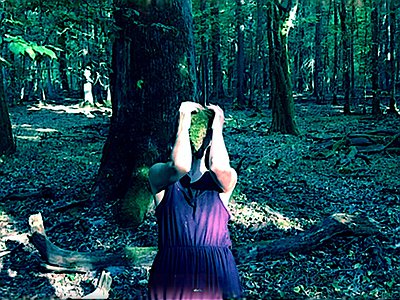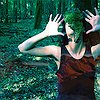Collaborations can take on many forms. What role do they play in your approach and what are your preferred ways of engaging with other creatives through, for example, file sharing, jamming or just talking about ideas?
There is a point or part of my creative process that I still find hard to share with others.This probably reflects the illusion of inner and outer space, self and others, subjectivity and reality, and all these dualistic preconceptions that constitute our individuality. And I’m super grateful for the moments in my life and my work when these binaries are transcended and the playful absurdity of the world and the self are laughed at wholeheartedly. So, this is something I’m really still working through, also in terms of performance, because somehow it’s also like a collaboration and I want to open up to it in a different way.
Maybe in my work as an independent curator I engage full heartedly in what I understand as community building and collaborative practices, with Cachichi and with Wirtshaus Secrets, a label we started this year which aims at documenting and archiving the work of sound artists and experimental musicians based in Linz and also with a residency program for which we just got a funding for and can’t wait to activate.
Right now I’m also producing Sonic Utopias, a podcast for Athens’ Movement Radio, which is a remote collaboration exploring the realms of fiction through sound and spoken word, where in each episode I bring three different artists and together we explore new imaginaries that can flip around the current paradigm, a means of divination through sound, that challenges the world’s orbit with little voices and resilient frequencies.
Finally, I'm also working on an installation that will give a different outlet to this podcast, for this year's Ars Electronica campus section.
Take us through a day in your life, from a possible morning routine through to your work, please. Do you have a fixed schedule? How do music and other aspects of your life feed back into each other - do you separate them or instead try to make them blend seamlessly?
I’m really not so good with schedules, and I’m struggling to get better at this by engaging with others, listening to their clocks and taking them in, because we live in communion. This year I started studying, so this determined a certain structure, where I spend most days learning and reserve the afternoons for my personal practice. My music is very tied to my life, and my living conditions often change. When I record, it’s often an escape from social life, a reworking of memories and an introspection, which of course is also life, but not one with a fixed schedule.
Can you talk about a breakthrough work, event or performance in your career? Why does it feel special to you? When, why and how did you start working on it, what were some of the motivations and ideas behind it?
With Blazej we started an initiative called Cachichi in Barcelona some years ago. It started as an events series, we would most of the time organise a line-up with artists we wanted to get to know the work of and connect with, and we would sometimes DJ after, when it was good conditions for a party. In the last year because of corona, it is solely an online showcase of artists we find inspiring as well as a podcast on teslafm.net, a Barcelona based radio curated with endless love by our ingenious friend Shakira Benavides.
But I can’t wait to also go back to organising local happenings. It has been such an enriching experience, one that helped me bloom inwards and outwards. It made me feel part of a big community for the first time. I realized that I can help build something that is significant to people, that everyone is happy to be noticed and needs to be encouraged to create. Beautiful creatures were invoked by our calling and supporting and motivating others also helped me position myself and my work in reference to this community and to grow as an artist and as a person. I really hope venues will remain open from now on and that we can meet each other again and renourish the community!
There are many descriptions of the ideal state of mind for being creative. What is it like for you? What supports this ideal state of mind and what are distractions? Are there strategies to enter into this state more easily?
For me it’s when I enter a sort of synaesthetic free association state that I recognise as inspiration. When I feel connected with myself and the world. Intentionally, singing helps me access it, writing in a stream of consciousness, or freely playing the piano also. Being in nature feels like that. Being close to one another feels like that. Listening, smelling, touching. Dancing. Losing track of time. Observing. Being silent. That;s one side of it for me. Sometimes I also tend to produce in a more conceptual mode, that’s in itself less explorative and more meticulous, painstaking. But this synaesthetic state is my favorite state of things and I feel like this is where music springs from.
Music and sounds can heal, but they can also hurt. Do you personally have experiences with either or both of these? Where do you personally see the biggest need and potential for music as a tool for healing?
There is indeed something special about sound, and everyone that’s ever been near a subwoofer can tell us about it. The way sound enters our body, as vibration, as something immaterial that can penetrate you, reaches very deep layers in us that are otherwise inaccessible. It also creates a portal to transcend the binary of animate and inanimate by gently annihilating the ego.
But, as your question implies, sound is not just a force of nature. It is a medium, a channel, which is being used daily as a weapon, as a cue to model individual and mass behavior, as a torture technique, it depends on the hands it’s in.
So, I think music cannot heal us alone, and there can be no personal healing without collective healing. It’s always an interdependence we talk about when we talk about healing. It’s not music but our ability to listen and to be one with silence that is healing itself.
I’ve actually been trained in the field of music therapy and I have worked with people that seek healing through sound and I see a great potential in it, and I want to go deeper into this path. I really detest a lot of aspects of western therapeutic tradition, the term “mental health” and its current infrastructures, their normative character, and the way they incorporate, appropriate and monopolize healing practices, so I remain very careful when associating myself with this world. But I feel positive about trauma awareness approaches, somatic experiencing and gestalt therapy and I’m excited about decolonial practices that connect the dots between shamanic traditions and autonomous health care practices & networks.
There is a fine line between cultural exchange and appropriation. What are your thoughts on the limits of copying, using cultural signs and symbols and the cultural/social/gender specificity of art?
This is so confusing. I don’t think there can be any generalisation, it is really case sensitive.
Personally, I love the forms of syncretism that emerge when different cultures clash. I feel like a mosaic of influences and I don't fully identify with a national identity. I am the granddaughter of refugees anyway. I speak a mutant mix of incorrect English, Spanish and Greek in my daily life, I love to wear djellaba from my trip to Morocco and a lion-dress I bought from a Senegalese seller in carrer de la Cera with my first and last decent salary and I picked up my friend Rebecka's Swedish accent and now I say "dis" instead of "this'’ and it feels like we accompany each other in the distance. I would rather hope all this is not cultural appropriation.
It’s different when cultural goods that emerge in an oppressed country, in the margins of society or in struggling minorities, get commercialized by privileged social groups, entrepreneurs or oppressive regimes that make profit out of the work of others while constituting them invisible.
Our sense of hearing shares intriguing connections to other senses. From your experience, what are some of the most inspiring overlaps between different senses - and what do they tell us about the way our senses work?
I try to practice zen meditation and deep listening as regularly as possible. When I do it with consistency, I find that, after a few days of practice, there is a moment that all sensory input and output becomes unified. A red car passing is the same as a bird chirping, same as a thought that crosses my mind, same as a fly sitting on my knee, or my friend’s movement while changing position. They are all ... happenings. Little episodes with beginning and end. They come to my attention, then they go out of it. Sometimes one at a time, sometimes they are also bumping into each other, like my senses.
There is a little book designed and published with Barcelona’s Urbild Editions called Listening and Growth that can serve as a token of this experience.
I wouldn’t choose one sense over another. Or one affinity over another. In this state. In general, I would say that for me touch and sound are the closest. But it all overlaps. Categories are only representational and I’m more interested in what lies beyond them.
Art can be a purpose in its own right, but it can also directly feed back into everyday life, take on a social and political role and lead to more engagement. Can you describe your approach to art and being an artist?
I used to feel like I make art to escape the world because I felt like I was not made for it. and I wanted to create my own world and escape there, with my friends. But of course, it actually never really worked. This escape was only temporary, and we were always going back to the very same place where you could not pay the rent!
I do feel some kind of political calling I was resisting when younger because I was raised in a climate of political afterglow. The illusions of my parents’ young years of a socialist heaven had collapsed and they were very bitter about it and very resigned, that was the atmosphere I was raised in. And then also the crisis “came” to Greece, neo-liberal austerity deprived the lower classes from their basic income, the protests couldn’t change anything, everyone felt powerless.
I like what Lynn Hershman says, that artists are the antibodies of society. We should be aware of what’s going on, we should make people aware of what’s going on. And together we should work towards health from the inside.
And so as I grow out of my comfort zone, I feel that by reclaiming our power and by empowering others, by facilitating the flow of information and renourishing atrophied junctions, by re-nurturing our sense of community, by learning a lot and unlearning even more, by listening to one another, by re-enchanting our world, we can change it. And will have to, in the years to come.



